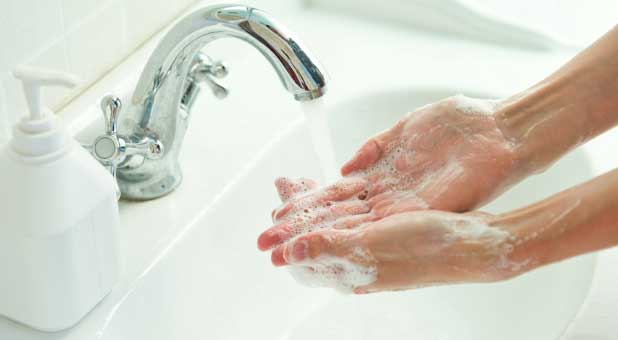Just because it’s cold and flu season doesn’t mean you’re destined to get sick. Sure, it’s tough to avoid germs when many of us are inside most of the day, avoiding wintry weather and getting less fresh air than during the warmer months.
And when there is coughing and sneezing going on around you, how do you prevent yourself from becoming susceptible? For starters, experts say, practice good overall health habits, like eating right and getting enough sleep.
Here are eight ways to avoid getting sick this winter:
1. Wash your hands. Frequently washing your hands with soap and water, or using an alcohol hand sanitizer will help keep germs at bay. When washing hands, health experts recommend rubbing them together vigorously for at least 20 seconds and turning off the faucet with a towel. While you’re at work, routinely clean objects and surfaces that are touched frequently, like a computer keyboard and mouse, phone, and doorknob.
2. Avoid touching your eyes. And keep your hands away from your nose and mouth, too. The flu and colds spread from person to person through droplets expelled from coughing and sneezing, and by touching infected objects and then touching our mouths, eyes, and noses, according to health experts. Cough and sneeze into a tissue. If you don’t have one, cough or sneeze into the inside of your elbow to avoid spreading germs.
3. Get a flu shot. The Centers for Disease Control and Prevention recommends that everyone 6 months and older receive the flu vaccine. Some groups of people, including pregnant women, children younger than 2, and people with chronic medical conditions like asthma and diabetes are considered especially vulnerable to getting serious flu-related complications and are particularly encouraged to get the vaccine. People with a severe allergy to chicken eggs shouldn’t be vaccinated because the vaccine is made using them, the CDC advises.
4. Limit contact. Flu symptoms start one to four days after infection, but an adult with the flu is contagious beginning the day before symptoms develop and up to five to seven days after they hit. So you can be spreading the virus before you know that you are ill. The Centers for Disease Control and Prevention recommend staying home for 24 hours after your fever has broken—and that’s if it breaks without the aid of fever-reducing medicine.
5. Practice health habits. Be sure to get enough sleep, eat nutritious food, drink lots of fluids, and get regular exercise to help maintain overall good health. Staying hydrated—drinking eight eight-ounce glasses of fluid a day—helps flush the body of toxins, reports WebMD.com. You’ll know you are well hydrated if your urine is nearly clear. Doing heart-pumping aerobic exercise, like brisk walking or biking, helps increase the body’s ability to fight viruses.
6. Don’t smoke. Cigarette smoke contains toxins that paralyze cilia, tiny, hair-like projections that line mucous membranes in our noses and lungs, and work to sweep out viruses and other invaders. Cilia also move mucous out of the lungs and generally work to keep them infection free. Health experts believe having impaired cilia is one of the reasons smokers suffer a higher incidence of pulmonary infection, according to Livestrong.com.
7. Eat yogurt. Bacteria in some active yogurt cultures work to prevent colds, according to the National Institutes of Health. Researchers believe the bacteria stimulate the immune system to fight disease. Studies have shown that people who eat yogurt daily have 25 percent fewer colds. So grab a spoon; two six-ounce servings a day of yogurt containing the bacteria Lactobacillus reuteri is recommended, says eHow.com
8. Hit the sauna. An Austrian study of 50 people—25 who took saunas over six months and 25 who did not—found that the sauna-bathing group experienced fewer colds. In fact, during the last three months of the study by researchers at the University of Vienna, the sauna group reported half the number of colds of the control group. Health experts speculate that the heat from a sauna weakens cold and flu viruses.
For the original article, visit newsmaxhealth.com.











































